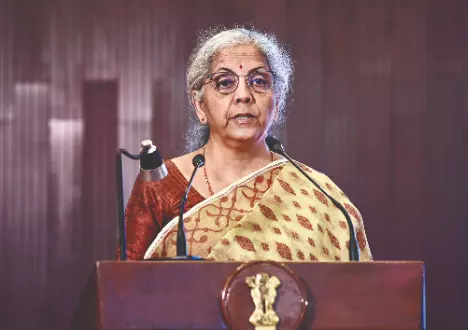‘India’s resilience stands out amid increased global uncertainties’

Pune: Finance Minister Nirmala Sitharaman on Thursday said India’s resilience stands out due to its strong macroeconomic fundamentals amid increasing global uncertainties.
Speaking at the 91st Foundation Day celebrations of the Bank of Maharashtra, the Union Finance Minister said the uncertainty in the global environment has increased over the past year, and its impact is being felt across countries.
“But amidst all these uncertain global situations, India’s resilience stands out and several favourable factors, such as strong macroeconomic fundamentals, a young demography, and greater reliance on domestic demand, provide the core strength to the Indian economy,” she noted.
Sitharaman said the economic resilience has continued, particularly in the April-June quarter this year, as well, where India’s GDP has grown by 7.8 per cent.
“India’s resilience is not accidental. They reflect proactive fiscal and monetary policies, bold structural reforms, massive infrastructure creation, both physical and digital, improved governance and enhanced competitiveness over the last decade,” she said.
The finance minister also highlighted that S&P upgraded India’s sovereign credit rating to ‘BBB’ (from BBB-) in August 2025 after 18 years, and Morningstar DBRS upgraded India to ‘BBB’ from BBB (low) in May 2025.
Recently, Japanese credit rating agency Rating and Investment Information (R&I) upgraded India’s long-term sovereign credit rating to ‘BBB+’ from ‘BBB’.
Sitharaman further said that with uncertainty remaining a defining feature of the global landscape, the role of banks becomes even more critical, not just as custodians of savings, but as engines of growth, providing the finance and support that businesses and entrepreneurs need to navigate volatility, seize opportunities and drive innovation.
“One principle, which we can never forget to adhere to, is adhering to the core principle of customer trust, which is the foundation of banking,” she said.
She emphasised that every complaint must be seen as an opportunity to improve, innovate and reinforce trust.
Grievance redressal must go hand-in-hand with root cause analysis, systemic corrections in products, processes and conduct, and a commitment to ensure the same complaint does not arise again, Sitharaman noted.
She further said the success of UPI shows what interoperability can achieve. A recent IMF note highlights the potential of UPI’s interoperable design as a model for the world.
“It is, however, important to remember that digitalisation alone is not enough. Integrity, empathy and human judgment remain irreplaceable,” the minister pointed out.
Speaking on the occasion, Department of Financial Services Secretary M Nagaraju said public sector banks should increase their focus on MSMEs.
They should provide more loans to MSMEs, he said, adding that education loans should also be given priority.
He urged banks to see that no education loan application should be rejected.
Nagaraju also said that banks should enhance their lending towards agriculture and allied activities.
In the same breadth, he asked banks to be vigilant about the quality of loans.
In her speech, the finance minister also lauded Bank of Maharashtra’s role in deepening financial inclusion across India.
Bank of Maharashtra’s return on assets (RoA) of 1.8 per cent in fiscal 2024-25 was way ahead of the average RoA of PSBs, which stood at 1.1 per cent.
Its CASA ratio of 53.3 per cent is the highest among public sector banks (PSBs), where the average CASA ratio is 38.8 per cent, and it also surpasses the majority of private sector banks.
As of June 30, 2025, the bank’s gross NPA stood at 1.74 per cent, and net NPAs were 0.18 per cent, at a multi-year low.
The provision coverage ratio improved to 98.36 per cent.



